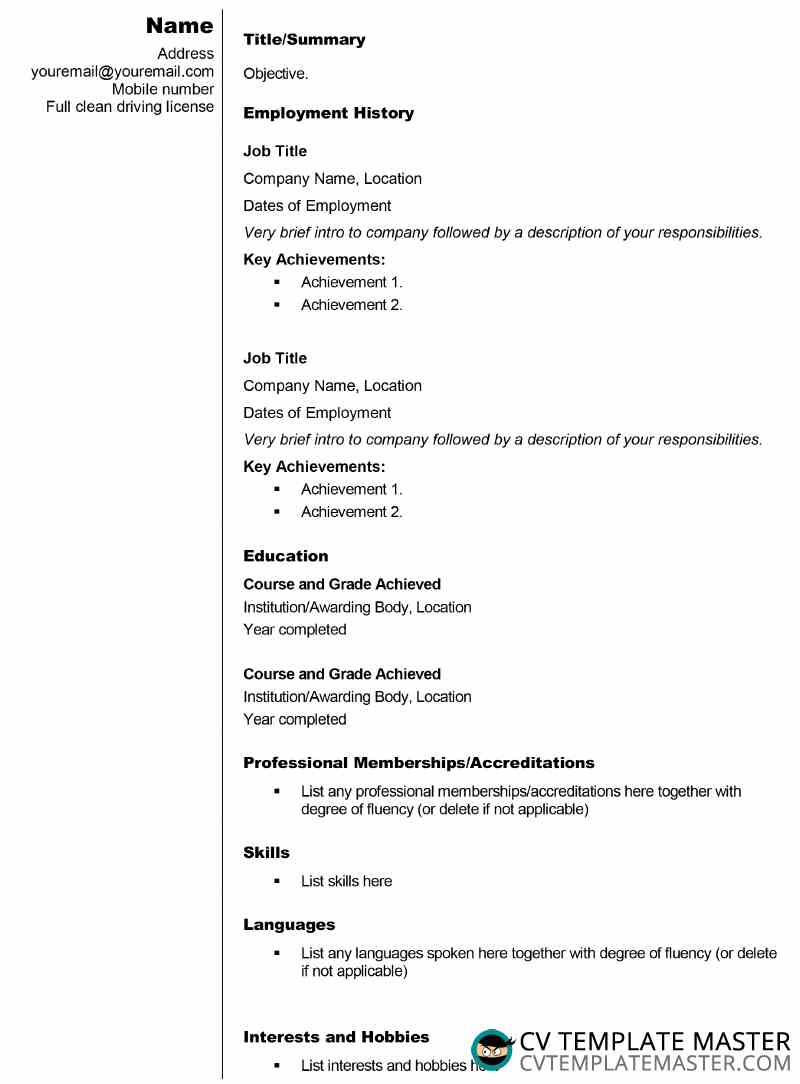Template details:

3 things to check before sending out your CV
Writing a CV is one of the most difficult challenges you’ll face in the job seeking process. Everything has to be perfect, from presentation and layout, to font style and size. Your content also has to be of the highest quality if you want to get past the rigorous checks performed by the hiring manager.
So now that you’ve finished writing your CV there are just a few things you still need to do before you send it out. Although you might be happy with what you’ve created, it’s important to remember that there are still some more steps to take before you apply for a job.
Here are 3 things to check before you send out your CV…
Check your contact info
First of all make sure you have at least two types of contact information – your email address and a phone/mobile number. If you don’t have an answering service set up yet on your contact number, make sure you do that before you apply. Keep your answer message professional and courteous.
If an employer tries to call you to arrange an interview or to ask you further questions and you can’t get to the phone, then having your answering machine enabled will allow them to easily leave a message so you can contact them as soon as your free.
An e-mail address on your CV also provides another contact method to make it easier for the employer to get in touch, and some employers prefer to use e-mail anyway rather than mobile. Always use a professional looking email address rather than your nickname or favourite film character. Obiwan666@hotmail.co.uk is fine if you are using that address for personal use; but for professional means you should always use your name. A good example might be – john.smith1990@gmail.com. You never know how the hiring manager may react to an unusual email address, so there is no point in risking it.
One of the most vital aspects of completing your contact details is ensuring it’s accurate. If you have just one error in your e-mail then it will either go to somebody else, or it will bounce back to the employer – which of course won’t look very good.
Obviously the same applies to an incorrect contact number, and although it’s doubtful that you will make a mistake in both, stranger things have happened and it won’t be the first time that an employer can’t get hold of an applicant. The recruitment manager might not want to waste a lot of time trying to get hold of you if this is making it difficult, and you could easily miss out on an interview because of a small mistake.
Proofread your CV for spelling/grammatical errors
No matter how many times you’ve checked over your CV and used the spell checking button in Word, there still could be errors – hard to believe but it’s true! Spell checks often get certain words mixed up like ‘their’ and ‘there’, and are not 100% reliable.
When it comes to grammatical errors, unfortunately the spell checker won’t always be able to spot every mistake. So although you should use this handy tool, your final option should be to not only read over the CV a few times, but to also get someone else to check it over – and in some cases we would also advise to get at least two other people to read it.
Try to find someone you can trust to give your CV a thorough proofread. Ideally someone who has current experience in handling and reading CV’s, who is either a manager or has hired people in the past and has first hand experience. Not only can they advise you on your spelling and grammar, they can also give you some advice when it comes to your content as well as structure.
Having a second opinion on your CV will go a long way in ensuring it’s of the highest quality. Assuming your CV is now completely free of any errors, you may also have some great feedback in which you can use to amend and improve your content.
That you’ve custom written your CV to the job/industry you are applying for
The most common mistake made when writing a CV is to make it too generic. Every CV should be tailored to the actual job description to ensure it covers the main aspects of the role as described in the job advert. A CV that has relevant skills, qualifications and experience will have a much higher chance of success against other generic CV’s.
The aim of writing and using a CV is to showcase your skills to a prospective employer, so if your CV doesn’t pinpoint what you can specifically offer to them, then you are making their job difficult when it comes to recruiting the right person. The hiring manager on average will only spend between 20-30 seconds reading a CV, and with literally hundreds of CV’s to filter through they simply don’t have the time to search for relevant information.
A well tailored CV will also show that you care about the role and the company. When the hiring manager reads through all the many applications they receive, they are always looking for a candidate who is clearly passionate about the role and dedicated to the success of their career. Someone who shows care and attention to detail in their CV will be a more attractive prospect to an employer – for obvious reasons. It shows that the applicant has taken the time to research the role and the company, and has used their initiative and written a well thought out CV.
The more effort you put into researching every little detail about the role and the company, it will clearly show in your CV. Not only will your CV give the employer what they want, it will also stand out from the rest of your competition.